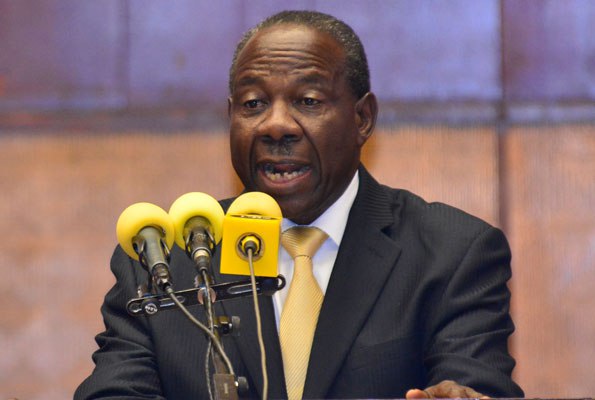
Uganda’s economy is not in decline and is expected to rebound in the medium term despite challenges especially in the agriculture sector, the Minister of Finance, Hon. Matia Kasaija, has said.
“Uganda’s economy is not in recession but only growing moderately,” said Hon. Kasaija, who was presenting the National Budget for the financial year 2017/2018 at a function held at Kampala Serena Hotel, Thursday 8th June 2017.
“The size of the economy is expected to rise to Shs 90 trillion, which is equivalent to US$ 25 billion, representing a real annual growth of 3.9 percent,” he said adding that, “This is lower than the target of 5.5 percent, but it’s higher than the Sub Saharan Africa average rate of 1.4 percent.”
On 31st May, 2017, Parliament approved a Shs 29 trillion National Budget for the 2017/2018 financial year ahead of the Minister’s presentation, a new requirement provided for in the Public Finance Management Act. The Budget was under the theme: ‘Industrialization for Job Creation and Shared Prosperity.’
The Minister said that government would focus on agriculture, industrialization and tourism to move the country into a middle income status.
“With the peace and security that has been guaranteed across country; availability of reliable electricity, and infrastructure, the economy is set to grow,” Kasaija said.
He said that government intended to enhance agricultural production and productivity through fast tracking irrigation projects in order to mitigate the adverse effects of climate change; increase the pace of industrialization, majorly agro processing to tackle the rampant youth unemployment.
He also said that government would focus on tourism targeting four million tourists bringing in $2.7b and contributing to employment.
“Uganda has a rich tourism potential but it’s affected by poor infrastructure, as tourists cannot easily get to the tourist areas. There is need for tourism infrastructure development and marketing Uganda as a tourist destination,” Kasaija said.
The Minister attributed the slowdown in the economy to slow recovery in Europe which reduced demand for Uganda’s exports; economic recovery in the US which led to reduction in capital inflows as investors preferred to invest home; and a global rise in interest rates leading to a high cost of capital and borrowing.
He also attribute the slowdown in the economy to civil conflict in the region that disrupt the country’s exports; influx of refugees putting pressure on social amenities; and negative effects of climate change, corruption, among others.
In order to reduce the accumulating domestic arrears, the Minister said that he was allocating Shs 300b to be released in the first quarter of the next financial year, to settle domestic arrears. He also said that Shs 50b of a planned Shs 500b, was allocated to the Uganda Development Bank such that it can provide low interest loans to the business community.
In the health sector, the Minister reported improvements in both infant and maternal mortality but said there was need to eliminate drug stock outs and mismatch of needs and supplies in health facilities. He reported shoddy works in the construction and rehabilitation of health facilities as well as absenteeism arising out of poor supervision of contractors and health workers.
“I appeal to MPs to be the watchdogs, because we share this responsibility,” he said.
Minister Kasaija however, said that there was need to deal with laxity and corruption for the country to attain middle income status. He added that Ugandans must change their mindset and stop waiting for government handouts but to work.
